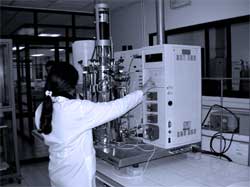Bioethanol:
an ecologic fuel
alternative
 Given the scenario of a world
energy crisis and faced with
Chile’s dependence on external
supply sources, interest has
grown to research the
development of alternative fuel
sources. In this context, the
large availability of vegetal
biomass in Chile, and specifically
in the Bio Bio region, constitutes
an attractive prime material for
ethanol elaboration. Given the scenario of a world
energy crisis and faced with
Chile’s dependence on external
supply sources, interest has
grown to research the
development of alternative fuel
sources. In this context, the
large availability of vegetal
biomass in Chile, and specifically
in the Bio Bio region, constitutes
an attractive prime material for
ethanol elaboration.
When ethanol is obtained from
biomass materials, it is referred
to as bioethanol. Ethanol, as a
bio-fuel, can be utilized in its pure
form or as an oxygenated additive
to gasoline. Among its many
economic and environmental
advantages is the increase in
octane, the recirculation of CO2,
improved emission quality, a
decrease in energy dependence,
and job generation.
With the objective of generating
the necessary scientific and
technological knowledge to
produce bioethanol from forestry
resources and to encourage
installations of bioethanol
production plants in the Bio Bio
region, the faculties of Chemical
Sciences and Forestry Sciences,
through the Renewable Resource
Laboratory, are developing an
Innova Bío Bío project together
with the Spanish company
Abengoa, a leader in bio-energy
in Europe and the United States.
Specifically, Abengoa is interested
in evaluating the possibility of
installing ethanol production
plants in Concepción. This project
is a multi-disciplinary project with
the participation of biochemists,
chemists, biotechnologists, and
forestry engineers.
The first stage of the project,
initiated in October 2003, will last
27 months. After this period,
Abengoa will evaluate whether
or not the project should conclude
with the installation of an
industrial plant. The total cost
of the project is $241 million
pesos, of which Innova Bío Bío
provides $106 million pesos
(44%). Dr. Juanita Freer, project
director, explains that, at the
laboratory level, they will study
two processes: hydrolysis or
saccharification, and the
subsequent fermentation of
glucose until alcohol is obtained.
In the world, there are many
ethanol production plants using
renewable resources, especially
agricultural resources. Chile,
however, presents the particular
characteristic of an abundant
supply of forestry resources, and
especially rapidly growing trees.
Furthermore, for the production
of this fuel, high quality wood is
not necessary, even sub-products
of the pruning, harvesting, and
sawing processes can be used.
Gasoline substitute
Bioethanol can replace gasoline
either partially or completely; in
its most common application,
between 10 % and 15% of
gasoline is used. As the alcohol
level in the mixture increases,
the combustion will liberate a
lower quantity of contaminants
into the atmosphere, especially
CO.
“In highly contaminated cities, it
is better to have fuels with a high
proportion of oxygenated
compounds, and even more in
countries like Chile, it is better
to obtain these fuels from existing
renewable resources. We should not forget that our country is
energetically dependent, and
consequently the generation of
an alternative fuel is highly
favorable, including from an
economic point of view”, indicates
the project director.
According to recent studies, it is
possible to forecast an increasing
international demand for ethanol
in the short term, which makes
the development of this
technology of strategic
importance for the country, and
particularly for the Bio Bio region. |

